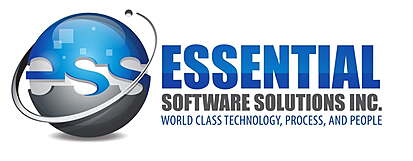What business owner or executive would not want to get more done in less time by automating business processes? The increase in ERP software adoption rate shows that every business wants fast and efficient ways to get things done. 50% of companies are acquiring, upgrading, or planning to update ERP systems soon. Do not be left in the dust using outdated and manual business processes!
In today's business world, ERP’s are indispensable. Organizations of all sizes rely on ERP software to organize activities, automate repetitive tasks, centralize data, and improve collaboration amongst departments. For decades, ESS has been providing ERP software solutions and implementation consulting services for companies across Canada and have seen how it has helped them get things done hassle-free.
The ERP system has revolutionized how companies do business, ranging from manufacturing processes, accounting, CRM, human resources management to supply chain, and more. Do you want to take your organization to another level of productivity? Essential Software Solutions can help you implement ERP software for your business.
Still not sure if implementing an ERP system is worth it? The next section will walk you through 7 perks you stand to gain when you adopt an ERP solution.
The 7 Ways an ERP System Will Help your Business
#1 Enhances Business Insight

Without automated processes in ERP systems, various departments within an organization may find it challenging to work together.
For instance, in many manufacturing companies, the marketing team relies on the sales team's feedback to make some decisions. With an ERP, the marketing team can collect data from the centralized ERP database, and do not have to wait for manual feedback (which is prone to error and takes more time in most cases) from the sales team.
Without automated processes in ERP systems, various departments within an organization may find it challenging to work together.
For instance, in many manufacturing companies, the marketing team relies on the sales team's feedback to make some decisions. With an ERP, the marketing team can collect data from the centralized ERP database, and do not have to wait for manual feedback (which is prone to error and takes more time in most cases) from the sales team.
#3 Speeds Up Business Processes
What do you expect when repetitive tasks are automated? Increased output, right? ERP software helps organizations to get more done in less time. The ability to automate tasks and make information available centrally makes business activities and decision-making processes faster.
For instance, the CEO may not necessarily need to meet with each department head regularly to have access to what is being done and discussed. Every activity going on in various departments is updated centrally in real-time via dashboards.
#4 Lowers Operational Costs
Through streamlined business processes and best practices, organizations save a lot of money on operational costs.
ERP software helps companies to get rid of repetitive tasks through automation and screen personalization. Having access to real-time business intelligence can help prioritize tasks and eliminate unnecessary effort, consuming time and resources.
#5 Improves Efficiency

In addition to making business processes faster, ERP software makes them more efficient. Think of the effort and cost to track business activities in complicated spreadsheets and collating data manually across departments. (Not the mention the risk of using shared spreadsheets, which makes data less private and easier to tamper with)
A major benefit of ERP’s is a centralization of data. Instead of several standalone databases with ambiguous records and disconnected spreadsheets, leading to data inconsistencies. An ERP application brings order to chaos, allowing everyone to access and use data derived from standard processes.
#6 Improves Customer Experiences
One important goal of every business is to have repeat customers—excellent customer experience precedes customer retention. Better customer management requires a timely sharing of customer information across teams.
A well-implemented ERP strategy can help organize customers' information and make their journey go smoothly. When integrated with Customer Experience (CX) and customer relationship management (CRM) software, you get more insights, which helps you deliver personalized customer service.
#7 Business Growth
With an ERP suite, business leaders generate real-time metrics that keep them informed and up to date. This gives those leaders the ability to make better decisions, faster.
The overall result of ERP systems is business growth. When business activities are streamlined, and accurate information is made available, an organization is bound to grow since misappropriation of decisions will be minimal.
Final Thoughts
Do you want to be ahead of the game in your industry? If yes, you cannot continue to ignore the relevance of ERP software. Reports show that organizations that have failed to implement ERP suffer significant setbacks in their business operations. We provide flexible ERP implementation services, including project management, business modeling, user training, process validation, and transition. Contact us to hear how an ERP can help you reach your business goals.











